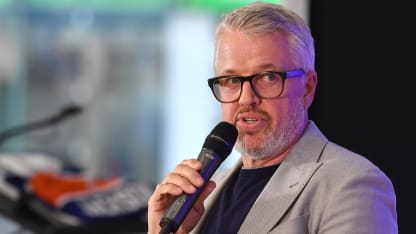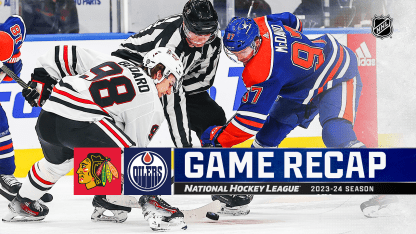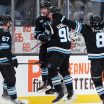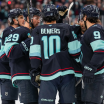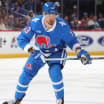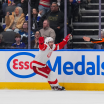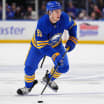EDMONTON -- Jeff Jackson left a prominent career as a player agent to become CEO of Hockey Operations for the Edmonton Oilers on Aug. 3.
It has been an interesting first few months on the job for Jackson, who represented Edmonton captain Connor McDavid with Wasserman Hockey before joining the Oilers.
Edmonton was considered a Stanley Cup contender heading into this season, but a slow start forced Jackson and his management team to make a coaching change, firing Jay Woodcroft and assistant Dave Manson on Nov. 12 and replacing them with Kris Knoblauch and Hockey Hall of Fame defenseman Paul Coffey.
Knoblauch was coach of Hartford in the AHL, an affiliate of the New York Rangers, when offered his first NHL head coach position, while Coffey was special assistant to Oilers owner Daryl Katz.
This is the second time Jackson has worked for an NHL team. He was assistant general manager and director of hockey operations with the Toronto Maple Leafs from 2006-2010.
Edmonton was 3-9-1 and tied for last in the NHL standings when it made the coaching change. The Oilers have climbed to 13-12-1 on the strength of an eight-game winning streak heading into their game against the Tampa Bay Lightning at Rogers Place on Thursday (9 p.m. ET; SN1, SNE, BSSUN).
On Tuesday, Jackson spoke about his first five months on the job and his expectations for the future of the franchise.
It’s been a whirlwind start for you with the Oilers, how are you settling into the new position?
“I’m settling into the job. It’s been three or four months and sort of getting a real feel for the entire organization, that process has been ongoing since I started. The team did not have a good start and that creates a lot of pressure around the team. But to be honest, I really didn’t let it affect me, I just tried to keep everything calm and look long term and understand the team we have here is a very good team and it would turn around and right now, that’s the way it’s looking.”
Any surprises on this side of the game, considering you had been on it before with the Toronto Maple Leafs?
“I said this to somebody last week, I didn’t really realize until I came back to this job how much the Leafs job helped me. When I left that job, I went to the agent side and did that for 11-12 years, but a lot of stuff came back really quick to me; things about team structure and the way scouting staffs work and communication, and that’s some of the things I learned when I was in Toronto. I wanted it to be different here, I wanted it to be a collective, breaking down silos within so we’re sharing information and that’s what we’re trying to accomplish and so far, it’s been really good.”
Is the key to that having good people around you and trusting those people around you?
“Yeah. We have a great staff. Brad Holland heads up the pro scouting and he’s got those guys working collaboratively. Him and Rick Pracey (director, amateur scouting) are talking a lot, Keith Gretzky (assistant general manager, GM Bakersfield Condors) is involved. I think using collectively the knowledge and experience we all have, I think this makes us all better.”
Tough decisions had to be made firing Jay Woodcroft and Dave Manson and hiring Kris Knoblauch. What went into those?
“It’s a very difficult thing to do especially when you’re talking about two outstanding guys and really good coaches. It was very hard, we talked a lot about it, we were trying to be super patient, we were trying to be supportive and ultimately it got to a point where we thought it didn’t seem like it was turning the right way. It’s not a reflection on them necessarily, it was just a reflection of where the team was at. We made the decision, and I had a lot of experience with Kris in the past with a bunch of players, both in pro, in junior and I had a high degree of confidence the way he empowers players and I see it here. It takes a while to get embedded. He started out with a couple of wins then went into a little bit of skid and then we sort of found our game and I can see confidence in a lot of our players, both at the upper end of the lineup and throughout.”
Knoblauch coming in seems to have worked out well. Are you really happy with the job he has done so far?
“Back to being collaborative, that’s what he’s like. He’s got all the coaches working really well together, not that they weren’t before, but they’re all working together on a bunch of stuff, they’re sharing information, talking to players a lot. I think he’s really good at communicating with the players one-on-one quietly, throughout the lineup, so everybody knows what their role is, takes ownership of it and really take pride in that.”
Paul Coffey going behind the bench seems to have had a big impact especially on some of the younger defensemen. How did you convince Coffey to be an assistant?
“When we were thinking about a coaching change, we were very fortunate the Rangers gave us permission to talk to Kris. That was Step One, but then there weren’t a lot of other guys available to go behind the bench and run the ‘D.’ We were thinking about the best logical step, and I said to ‘Coff,’ ‘would you consider doing it?’ He had a relationship with all these defensemen, he had been nurturing them for three or four years in his role as player development person and also as an adviser being around the team. They all know and respect him having a relationship with them. At first, he was, ‘I don’t know, I’m not sure about upending my life.’ But I think it was a day later he said to me, ‘You know that thing we talked about, I love the Oilers, I would do anything for the Oilers,’ so we just started talking about it and ultimately decided that was the best move for us. I think the gut feeling about him knowing the players and them knowing him has really paid off.”
There were some questions on how one of the best offensive defensemen in the history of the NHL was going to help the team defensively?
“I think that’s a narrow view of it. Although he is an amazing offensive defenseman, that’s the way he played because he has success on the teams he was on. But he’s got an amazing hockey mind and that part of it, teaching them to play ‘D,’ or when to jump in the rush, or when to move the puck, talking to each other, reading off each other, all the stuff are things that he had from his career and post career. So I think that thinking he was always an offensive defenseman and doesn’t know how to teach defense is inaccurate.”
How much can you take from your agent background to this new position with the Oilers?
“I think I can take a lot, and I said this to [the media] the day I got hired; as an agent you get to deal with 32 teams and you see what they do in their minor-league systems, you see what they do when they send players back to junior, everybody does things differently. So you get a wider view of the way people do things and you see the teams that do it really well and then some who you think they can do it better. So now I’m drawing on all of that. And the relationship part of it, as an agent, I dealt with everybody, so I know everybody around the League, I know the media people, so it really is transferable, you’re just sitting on a different seat on the other side and using that knowledge to your benefit.”
In the short-term things are going in the right direction, but what is your long-term vision for the team?
“I think sports in general, hockey is no different, you have to be on the cutting edge of technology, you have to be on the cutting edge of using data. You have to have a really robust player development, so all of those things, human performance, sports science, it all mirrors together and it has to work as a hub. That’s what I’m working on. It doesn’t happen overnight, but we’re making some good progress, and we just have to keep working on it.”
General manager Ken Holland is in the last year of his contract. Have discussions started on his future?
“Ken and I have a great working relationship and a good understanding of everything. We haven’t talked about it, we’ve sort of said that we’re going to focus on this year, we have an opportunity to compete. Now that we’ve clawed our way back to .500 and now we have to build from there and we’ll talking about things when it’s an appropriate time to do so.”
Was the key getting back to .500 and being on even ground, so now the team can build from there?
“I think it might be a psychological barrier for sure, but it’s a nice feeling because three weeks ago, you looked at it as a big hole. But I always did feel like we were going to be able to claw our way back because of the players we have in our room. It’s nice that we’re there now, but we can’t take the foot off the pedal.”
With the team playing the way it is, do you now get a better indication of what you have here?
“When things are going really bad then everything looks bad. Everyone is criticizing the goaltending, they were criticizing the defense. When we start working as a unit and you start believing in each other and then you start to not think as much and you react naturally. That’s what I see, it’s reflecting on our goaltending because our ‘D’ is playing better, and our ‘D’ is playing better because our forwards are supporting better. I see the team a lot clearer, but I’ve had an opportunity to watch the team a lot before I joined them. I think the previous 120 games before I joined the team, we had the second-best team in the League as far as points, so it was a good team already and there were some changes that were made lower in the lineup. You saw the other night, (4-1 win against the New Jersey Devils) our fourth line had a goal, could have had a couple of more and carried the play. If we can get that throughout our lineup, all six of our [defensemen] and our goaltending, I think we’re in good shape.”
Leon Draisaitl’s contract is up in two years, Connor McDavid is up in three, is that something you start working on now or wait to get closer to the end of their respective terms?
“I’m not spending a lot of time thinking about it right now. I think the key for those two guys and everybody else in this room that can choose to leave when they’re free agents, you have to provide two things: You have to provide an environment where you can win and you have to treat the players well. I know that (owner) Daryl (Katz) has always treated the players well and we’re going to continue to treat players and their families top-notch. We have to be there when the party’s on and if we’re there, we’re going to have a good chance of keeping the players we want to keep and that’s on us.”
